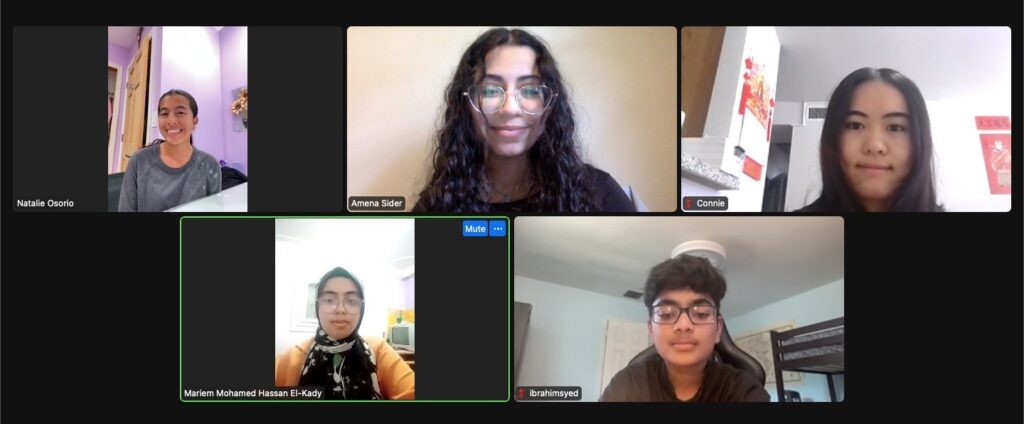The Adventures of the Nutritional Kingdom Project
Meet the winning team of the Spring 2023 Junior Academy “Healthy Snacks” Challenge

Team members: Natalie O. (Team Lead) (United States), Lara K. (Jordan), Connie H. (United States), Mariem M. (Egypt), Ibrahim S. (United States), Amena S. (Jordan)
Mentor: Leticia Mendoza-Martínez (Mexico)
Childhood obesity has become a major public health issue around the world. In the United States alone, 1 in 5 children is overweight or obese– a particularly prevalent issue in the Hispanic community, where lack of access to affordable, healthy food along with other socioeconomic factors create major disadvantages. For the Junior Academy’s 2023 Spring Innovation Challenge on “Healthy Snacks”, six students formed an international team to develop “The Adventures of the Nutritional Kingdom”– a campaign to encourage healthy eating aimed specifically at Hispanic children in the southern U.S. Collaborating across continents and time zones, the students met online to create the winning project. “Cooperation enhances the goal because when a group from different countries of the world gathers to work on one goal, this undoubtedly confirms its importance,” Meriem says.

According to the CDC, 26.2% of Hispanic youth are obese. Childhood obesity can have broad consequences, from long-term health implications like Type 2 diabetes, high blood pressure, and heart disease, to psychological impacts like anxiety, depression, and low self-esteem, (often related to bullying). Before devising their solution, the team conducted a survey of Hispanic families in both Spanish and English to help them identify a novel approach. Natalie assumed the role of Team Lead. “I was in charge of overseeing everyone’s collaboration efforts, notifying team members of their weekly tasks, and was the head website developer for the team. It was a surreal experience being a leader of such intelligent and motivated students. Our ideas were productive, and our final results are absolutely spectacular,” she says. “I learned valuable leadership and time management skills that will help me in future years to come.”
To reach the target audience, the team created an interactive, kid-friendly website with a vibrant jungle theme and gender-neutral animal characters, as well as a series of articles providing useful information on healthy nutrition and eating disorders. They also explored recipes, recreating a popular snack using alternative, healthier ingredients, and created an app with 13 different games that incorporated important nutritional information.
Meriem worked for hours on developing the games, using vivid colors attractive to young users. “I contributed by writing four articles on healthy eating habits and summarizing the problem and background of our solution,” explains Connie. “I also researched (former First Lady) Michelle Obama’s ‘Let’s Move’ campaign, alternatives to unhealthy snacks and previous initiatives introducing healthy snacks.” Ibrahim conducted research and contributed extensive data on physical exercise and hydration. “I read articles and answered questions such as how people got their nutrients during the Great Depression, foods that can be cooked at low temperatures as well as foods that keep hydration in your body and more,” he says. Among her many contributions, Amena focused on how to reach the target audience for the app. “I provided my knowledge and skills in business and marketing the product to help us reach children, whether they were high or low-income children, as well as designing the product’s packaging,” she explains.
The team is excited to see their carefully considered, multi-faceted project create social impact, hoping to find ways to even further reduce mental stress and health problems among Hispanic children. In particular, they want to make their website available in Spanish as well as English to expand its reach. “This experience has fostered a deeper understanding of the power of teamwork and its capacity for optimizing collaborative efforts between human agents,” says Lara. “Future pursuits will undoubtedly involve enhanced focus on cooperation among individuals to promote more effective outcomes.”
The Junior Academy was supported by the Stevens Initiative, which is sponsored by the U.S. Department of State, with funding provided by the U.S. Government, and is administered by the Aspen Institute.
